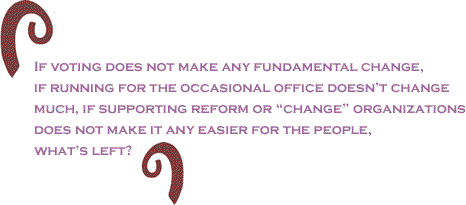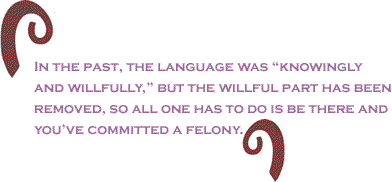The new law just signed by President Obama
sounds rather innocuous, but it takes the nation a step
further in the restriction of citizens� rights to demand
a redress of grievances of their government and to speak
in a public place about what�s on their minds.
Although the law, H.R. 347 (Federal Restricted
Buildings and Grounds Improvement Act of 2011), is regarded
by many, even civil libertarians, as a nuance to law and
practice that have been in effect for years, it makes
it a felony for anyone who �knowingly� enters restricted
federal buildings or grounds without lawful authority.�
In the past, the language was �knowingly and willfully,�
but the willful part has been removed, so all one has
to do is be there and you�ve committed a felony.
Here�s a summary of the law, from the Library
of Congress� �thomas� website:� ��a posted, cordoned off,
or otherwise restricted area of: (1) the White House or
its grounds or the Vice President's official residence
or its grounds, (2) a building or grounds where the President
or other person protected by the Secret Service is or
will be temporarily visiting, or (3) a building or grounds
so restricted due to a special event of national significance.�
This addition to what is considered already-established
law makes it possible for the Secret Service to make a
determination that any event is �special� or of �national
significance,� and, therefore, will be able to call it
a restricted area and be able to keep out anyone who might
act in a manner they determine to be disruptive.� The
charge for violation of their designation would be a possible
felony charge for the protestor.
It was immediately called the �anti-Occupy�
law, probably because the Occupy Wall Street movement
and other Occupy movements around the country are on the
minds of government officials, law enforcement, and corporate
CEOs at this time.� But, there have been, and will be,
many organizations and individuals who have tried throughout
our history to let the powers that be know that there
is something very wrong and that elections and the trappings
of democracy do not seem to be making any difference.

That�s what the Occupy movement has done
since last fall.� For much of the history of the nation,
however, there have been anti-taxation movements, civil
rights movements, union movements, and many other efforts
of the people to make their displeasure known to those
in power.� In the current movement, much of the emphasis
is on corporate control of the economic system and, through
its power in the economy, control of the political system.�
To a great extent, Corporate America also controls much
of what passes as the culture of the U.S.
A majority of the people seems know that
this is wrong and damaging to the body politic, but the
opposition to corporate control of virtually everything
is fragmented and generally cannot hope to achieve the
concentrated power of the corporations and their representatives
in government at every level.� The opposition, in all
of its manifestations, can do what?� If voting does not
make any fundamental change, if running for the occasional
office doesn�t change much, if supporting reform or �change�
organizations does not make it any easier for the people,
what�s left?
There is always massing in the streets,
to show that change is needed.� American history is full
of examples of peoples� movements that have been crushed,
despite the rights guaranteed in the Constitution and
the Bill of Rights.� There always has been one catch:�
When the people, in their numbers, are declared a danger
to public safety or to national security, their movements
can be put down by police, National Guard, or the army
with impunity.� Who makes such a declaration?� Those at
the top of the heap.
 Finally,
in the Occupy movement, there is an attempt to address
most of the serious issues of the people, young and old.�
Finally, the discussion has begun about the lop-sided
balance of economic and political power in the U.S.� Finally,
the pain and suffering of millions of workers, students,
and their families are beginning to be exposed.� The problem
of something as basic as hunger or food insecurity for
millions of people is being exposed.� The disparity in
wealth is being discussed.� Those responsible for killing
the economy are being identified and their actions discussed.
Finally,
in the Occupy movement, there is an attempt to address
most of the serious issues of the people, young and old.�
Finally, the discussion has begun about the lop-sided
balance of economic and political power in the U.S.� Finally,
the pain and suffering of millions of workers, students,
and their families are beginning to be exposed.� The problem
of something as basic as hunger or food insecurity for
millions of people is being exposed.� The disparity in
wealth is being discussed.� Those responsible for killing
the economy are being identified and their actions discussed.
It�s true that the people have more gadgets
than in the 1950s, but the problems of adequate housing,
educational opportunities, health care, and access to
wholesome and nutritious food are just a few of the fundamental
things that are more and more out of reach of millions
of families.
Many of the Occupy leaders (and, despite
their loose structure, there are leaders) are students
who have found themselves coming out of colleges and universities
with overwhelming debt and no jobs to pay for their education,
let alone to live a decent life.� It is easy for most
Americans to relate to that, because so many families
know directly of that problem.�
Their desperation is palpable and that�s
what scares those in power.� You cannot have a society
in which 80 percent of the people control just 15 percent
of the wealth and not have discontent on a scale rarely
seen.� People took to the streets, starting with the protests
of working women and men in Wisconsin, where the governor
last year acted to remove labor rights of public workers
and that seemed to signal to all workers, public and private,
that the powerful were making no pretense about their
war on the working class (or the middle class, however
one chooses to describe it).
It is likely that public protests and demonstrations
and rallies will come in waves, and they will come to
a place near you.� That�s why H.R. 347 had to be adopted
by the Congress and signed by the president.� �It�s not
much, just an addition to laws already in place,� we are
told.� But, they are worried about the unrest.

One of the phrases in the law makes it
possible for the Secret Service or the Homeland Security
Department to determine whether a building or grounds
is restricted, �due to a special event of national significance.��
That could be an appearance by a presidential primary
candidate (anywhere in the country) or something big,
like a national political convention or the Super Bowl.�
In any case, it is not the president, or Congress that
is making the determination, rather it will be the bureaucracy
of law enforcement agencies that will make the decisions.
It is hard not to compare the �free speech
pens� into which protestors and demonstrators were herded
under the Bush-Cheney Administration (so that George W.
Bush and Dick Cheney and others did not have to see or
hear the people), with the actions of a junta official
in some banana republic.� Often, they were placed as some
distance from the site of the appearance of officials
who should be made to hear the people.� As far as can
be determined, for the most part, the pens were accepted
as part of �lawful assembly,� but it is going to become
more difficult to be �lawful� and still be heard, as called
for in the Bill of Rights, with the piecemeal disintegration
of First Amendment rights that we have seen and are seeing.�
Too many people will be liable to be designated
as felons, just for practicing their right to assemble
and to free speech.�

BlackCommentator.com
Columnist, John Funiciello, is a labor organizer and former
union organizer. His union work started when he became
a local president of The Newspaper Guild in the early
1970s. He was a reporter for 14 years for newspapers in
New York State. In addition to labor work, he is organizing
family farmers as they struggle to stay on the land under
enormous pressure from factory food producers and land
developers. Click here
to contact Mr. Funiciello.

